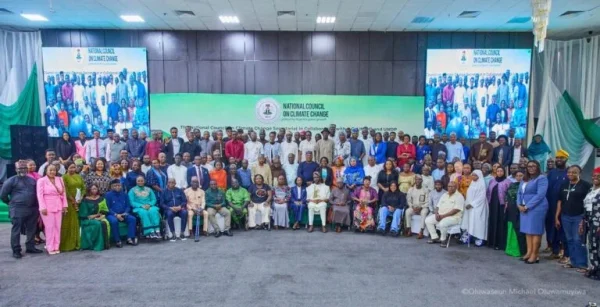The National Council on Climate Change (NCCC) has validated the Just Transition Guidelines and Action Plan (JT-GAP) to support Nigeria’s shift toward a sustainable, low-carbon economy.
This was disclosed in a statement by Prof. Chukwumerije Okereke, Lead Consultant on the JT-GAP, and made available to journalists on Wednesday in Lagos.
The validation ceremony, held on October 6 and 7 at the Nigerian Air Force Conference Centre, Abuja, marked a major step toward achieving an equitable energy transition in Nigeria.
The JT-GAP was developed by the Centre for Climate Change and Development (CCCD), Alex Ekwueme Federal University, Ebonyi State, with support from the International Labour Organization (ILO), United Nations Development Programme (UNDP), and United Nations Industrial Development Organization (UNIDO).
The two-day event began with a technical session where experts from government institutions, academia, and international organizations reviewed the draft document.
Prof. Emmanuel Oladipo, who represented Okereke, presented the main findings, while Dr. Austine Okoh discussed key aspects of gender inclusion, youth empowerment, and social equity.
Stakeholders in attendance included representatives of federal and state ministries, agencies, civil society groups, labour unions, women and youth organizations, and the private sector.
The Director-General of NCCC, Mrs. Tenioye Majekodunmi, described the JT-GAP as “a comprehensive, evidence-based document reflecting Nigeria’s commitment to a fair energy transition.”
She said the plan aligns with the country’s Nationally Determined Contributions (NDCs), Energy Transition Plan (ETP), and Nigeria’s goal of achieving net-zero emissions.
“The Just Transition is not merely environmental; it is a people-centred vision ensuring that economic growth, social justice, and sustainability advance together,” Majekodunmi said.
She urged all stakeholders to take ownership of the plan and ensure its effective implementation across relevant sectors.
In his remarks, Prof. Okereke said the JT-GAP provides clear guidance on aligning Nigeria’s climate ambitions with its development priorities.
“Our report shows how Nigeria can unlock green growth and innovation while ensuring climate action does not undermine jobs and livelihoods,” he said.
He added that proper implementation of the plan would protect workers, women, youth, and other vulnerable groups from the adverse impacts of the transition process.
Participants at the event included representatives from the Presidency, National Assembly, state governments, development partners, labour unions, and youth advocates.
They commended the inclusiveness of the process and the quality of the document, describing it as a milestone in Nigeria’s evolving climate policy framework.
According to the NCCC, the Just Transition Guidelines and Action Plan will serve as a blueprint for integrating social equity, decent work, and community well-being into Nigeria’s journey toward a sustainable, low-carbon future.


